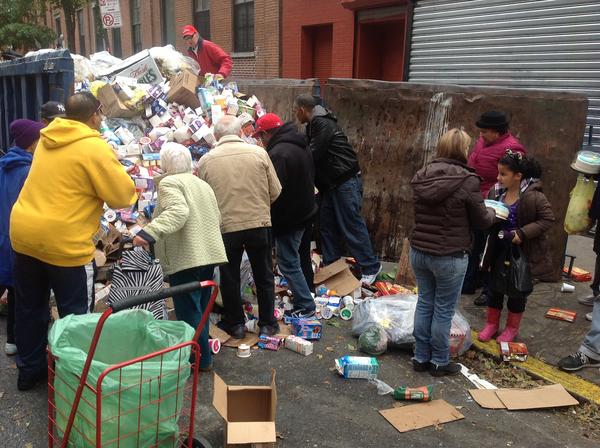By now you are well informed as to the situation which unfolded in the northeastern US after Hurricane Sandy passed through, specifically in NYC and New Jersey. Looting and violence have broken out in small pockets, people are dumpster diving for food, water is not potable in many areas (or even available) and lines for gasoline are miles long with no resolution in sight. Many of these tragedies were indeed unavoidable simply because the size and scope of the storm overwhelmed even the best laid plans (sandbag levies, mandatory evacuation orders, pre-positioning logistical assets prior to the storm).
Severe and sometimes life threatening inconveniences like public transit systems going down, supply chains being broken, tainted water from flooding and others are byproducts of a disasters which will almost always occur. Still yet the amount of pain and suffering encountered by people after this horrendous disaster could have been significantly reduced had they adopted preventative measures (read: prepping) which would have ensured their preparedness prior to the storm. Even a minimal amount of prepping would have averted disaster for many who are currently in need. Having enough supplies on hand for 1-2 weeks worth of survival could have been the rule rather than the exception, sadly it was not.
I mention many times on this website the mantra that follows in a disaster like Sandy, it goes something like this: “well, why doesn’t someone do something?” In this case that someone refers to the government.
“No National Guard. No Red Cross. No FEMA. No [New York Department of Environmental Protection]. No garbage trucks. American flags are flying all over this neighborhood. Where is our government?”
People who might have had the means but failed to prepare are waiting on the government to provide them with their every need after the storm. I’m not talking about those who had their entire home swept away by sea water either, people who have homes (still) but yet have nothing in the way of food or water storage.
In New York City, Donna Solli rode out the storm in her Staten Island home because she has an elderly dog. She told visiting officials she had not had much to eat. “One slice of pizza in 48 hours,” she loudly told officials in front of a pack of reporters. “We’re going to die … we’re going to freeze. We got 90-year-old people. You don’t understand. You gotta get your trucks down here on this corner now.”
Even with the recovery slowly taking shape the return back to the status-quo is still a long way off. Stores will still be out of food, gasoline will remain an item in high demand which will stall logistical efforts. People are panicking and are so flustered by a few days without power they are referring to it as a “pioneer lifestyle.”
The two couples, both without electricity or water, are ready for their pioneer lifestyle to end. Marlaine Olinick, 33, talked of cooking soup on the barbecue grill. Comer Aebersold, 34, said her family flushes the toilet with water from a bucket, but the water the family filled in the bathtub is beginning to run out. “We’re beyond panicked,” Aebersold said. “It’s not good with kids.” And when the lights come on, life will still be difficult, she said. “None of these stores are going to have any provisions.” Others are coping with the lack of amenities by simply leaving.
I realize that many people had their entire lives wiped away by the storm, and for those individuals I surely feel some sympathy. Maybe they refused to BugOut because they didn’t think the storm would be that bad or they never anticipated the type of flooding that occurred. For whatever reason they lost everything and are now without the basic necessities. However there are still plenty of people who still have their homes or apartments and are suffering because they failed to prepare. These people did not have any food, water or even flashlights on hand to make life easier after the storm pushed through. They are now completely dependent on resources that have to come from miles away in order to be distributed by hard working volunteers or members of the National Guard. Not only that, they are getting upset because these items can’t all be distributed within a day or two of the storm passing through. By failing to prepare for this storm many people prepared to fail. They are now finding out that unfortunately the government cannot sprinkle fairy dust over the affected areas and magically make everything better again. Take control of your prepping strategy so this does not happen to you.










5 comments
Skip to comment form
It’s amazing how many people have to learn the Hard Way. They call preppers and survivalists whackos until something like this happens, and then we see who was really right all along.
Author
Agreed David,
The sad thing is many who were not directly impacted by the storm still will not take heed. I can hear it now, “but I live in _________ and stuff like that just doesn’t happen around here.”
PJ
All i got in this world is my little tactical molle bag filled with a demo hammer, ka-bar, and some other shit i’ll prolly never use. Compass and fishing kit and tactical flashlight, NV goggle and USB solar panel to charge the 440 ham band, crap like that. AUDI5000 babay.
My family has endured two years of daily earthquakes including many 5+ magnitude earthquakes, starting with a 7.1. To top it all off the day our small town flooded we had the first snow of the season. As a town we voted to have our own water treatment and sewerage plant paid for by our own extra taxes. We saw no government help (and it drives me nuts that people persist with that myth) until the flooding and then only for the pensioner units because they sit next to a creek.
I was prepared long before the earthquakes started as living in a country town we have regular power outages and all sorts of random things without help nearby. What we do have is street by street Civil Defense teams so that we check on each other and pool resources keeping a list of what is where. We don’t expect any to help us because the track record tells nobody official comes and frankly they need to be helping the townies. City people just don’t seem understand that sewerage and drainage systems crack and break, power lines come down and phones just don’t work. I know friends who after two years of the same earthquakes, often no power or toilets for weeks etc still say if it gets bad they are coming to my house. Well my neighbours might say something different.
Author
Sara,
Truly an inspirational post you have shared, it’s systems like you all share in your community which will get people through these tough times. So many people just wait for the gubmint (or someone) to do something, whatever that something may be. You all have been proactive and have a great way to address the difficult challenges life throws at us. Very good stuff, thanks for sharing.